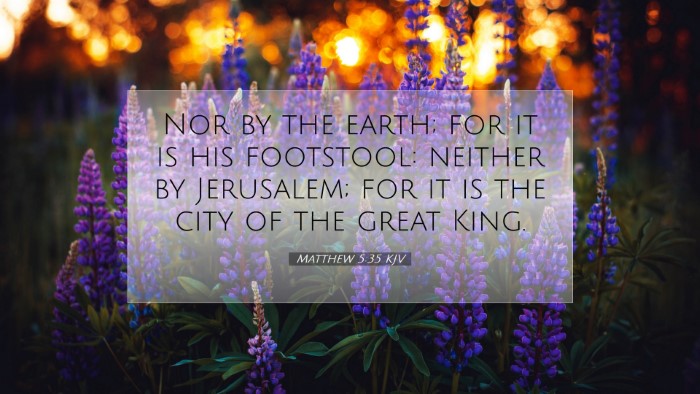Commentary on Matthew 5:35
Verse: "Nor by the earth; for it is his footstool: neither by Jerusalem; for it is the city of the great King."
Introduction
Matthew 5:35 is a part of Jesus' Sermon on the Mount, where He teaches the principles of the Kingdom of Heaven. In this particular verse, He addresses the issue of oaths and vows, the significance of integrity in speech, and the reverence due to holy places. The teachings encapsulated in this passage invite believers to reflect deeply on their words and the meanings attached to them.
Exegesis of Matthew 5:35
This verse follows the admonition against swearing oaths improperly and underscores the futility of swearing by created things. Jesus references the earth and Jerusalem, explaining these belong to God and should not be invoked lightly.
Insights from Public Domain Commentaries
Matthew Henry's Commentary
Matthew Henry emphasizes that to swear by the earth or Jerusalem is to show a lack of reverence for God’s creation and His sovereignty. He likens the earth to God's footstool, reminding us of God's omnipresence and authority over all things. Henry poignantly notes that swearing by such things implies a diminished view of God and His power. Instead of relying on earthly references, Henry advocates for integrity in our statements; let our 'yes' be yes, and our 'no' be no. True believers should not use oaths as a crutch for their words, but let their character speak.
Albert Barnes' Commentary
Albert Barnes contributes to this discussion by elaborating on the significance of Jerusalem as "the city of the great King." He explains the historical and spiritual importance of Jerusalem in the Jewish faith, viewing it as the center of God's revelatory activity. To swear by Jerusalem is to invoke God's presence in the sacred city. Barnes stresses the importance of holiness in our declarations, contending that invoking the name of God should demand a higher standard of accountability in our promises and affirmations. He encourages believers to let their words carry weight without the need for swearing, aligning their lives with the truth of God’s presence.
Adam Clarke's Commentary
Adam Clarke focuses on the theological implications of the verse. He points out that calling upon the earth for an oath reduces the infinite Creator to the level of finite creation. Clarke emphasizes the folly of swearing by earthly things, as all elements of creation will eventually pass away, while God’s word remains eternally true. He takes a strong stance against oaths, asserting that believers should cultivate an inner character that reflects truthfulness and fidelity. Clarke’s perspective pushes toward an understanding that our relationship with God should manifest in authentic speech that does not require the embellishment of oaths.
Theological Themes
- The Sovereignty of God: The verse illustrates God's control over the earth and His chosen city, emphasizing His supremacy over all creation.
- The Integrity of Speech: Jesus calls His followers to a lifestyle of integrity where their words are inherently trustworthy, negating the need for oaths.
- The Sacredness of Place: Jerusalem's reference invites reflection on the holiness associated with God’s dwelling and the reverence it demands.
- The Call to Authenticity: Believers are challenged to embody truthfulness, reflecting Christ’s teachings in their daily lives.
Application for Believers
As pastors, students, theologians, and scholars study Matthew 5:35, they are invited to consider how Jesus' teachings challenge modern practices of speech, oaths, and promises. The passage implores us to strive for a higher standard—where truthfulness is a hallmark of our character. In pastoral ministry, this translates to modeling integrity in our communications with parishioners and within the community. For students of theology, this verse can serve as a foundation for exploring how the Christian ethic shapes our dialogue and commitments.
Conclusion
Matthew 5:35 stands as a powerful admonition against trivializing the spoken word. Drawing from insights across the rich tradition of biblical commentary, it is evident that Jesus calls His followers to profound respect for the weight of their declarations. As we navigate our faith journey, the essence of this teaching should drive us towards authenticity and a deeper honor for God—acknowledging that our words are reflections of our hearts and our relationship with the Divine.


